Quails make great pets and are quite easy to care for. Many people fall in love with their funny little personalities and their quirky behaviour.
Quails are ground dwelling birds meaning they spend their whole lives on the ground. It is very unusual for them to perch. They enjoy hiding, sand/dust baths and foraging for food.
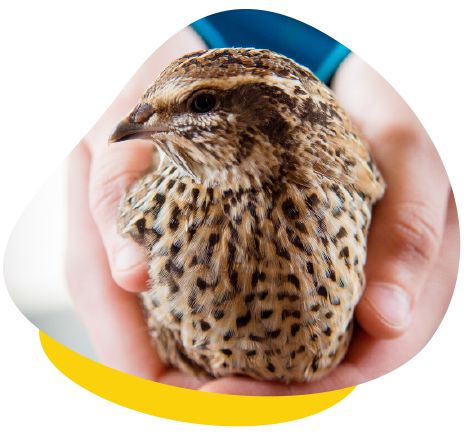
Husbandry
As quails are ground dwelling birds they have been known to be kept in the same aviaries as finches, canaries, pigeons and most small docile parrots such as budgies, but care should be taken with lovebirds as they may attack the quails.
Quails need space to run around, so be mindful not to overpopulate their enclosure/aviary.
Their enclosure/aviary should consist of 7mm square wire or solid flat galvanized metal sheet to prevent injury to their feet and to prevent predators from getting in. At least half of the roof should be covered to protect from the elements and one wall should be solid.
Quails are easily startled so a double door or higher door should be used to prevent escaping. Quails require hiding places such as hollow logs, large pipes, upturned wooden crates etc. Some plants should be added for extra hiding places such as potted bamboo or grasses. Quails prefer to bathe in sand on the floor rather than water. If flooring is not sand this can be offered in a kitty litter dish or small container.
All birds are predisposed to feet problems (pododermatitis) if they are kept on an incorrect surface. This problem is particularly common in quails; therefore, it is extremely important to ensure that you have the correct flooring. Avoid wire and concrete floors as this predisposes to damage to the bottom of their feet. Clean dry sand can be provided as flooring over concrete, covering with a layer of dry leaves, sugar mulch or grasses over part of the sand.
Diet
Quails have specific dietary requirements depending on their age and activity levels. In general, your quail’s dietary requirements can be reached by providing a high-quality commercial gamebird diet as most of their diet.
The protein content is important, and this should be displayed on the packaging. Growing quails (6 weeks and under) require a higher percentage of protein (often around 25%), about 12.6 megajoules (MJ) of metabolisable energy (ME) per kilogram and 1.0% calcium. Most commercial starter ration for game birds or turkeys contains 25-28% protein. If this is not available, a chicken starter ration (20-22% protein) can be used.
Mature birds require similar protein, kilojoules and calcium to the 6 weeks and under quails except their calcium and phosphorus levels must be increased. Shell grit or ground limestone can be added to the diets after 5 weeks of age if needed.
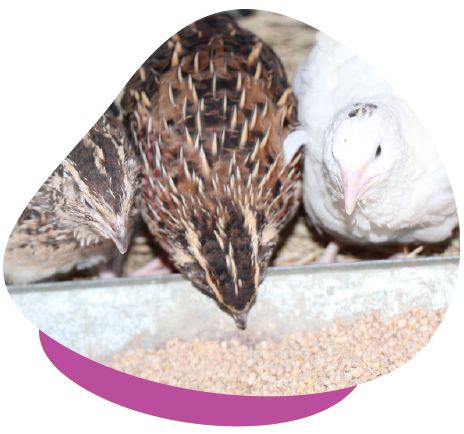
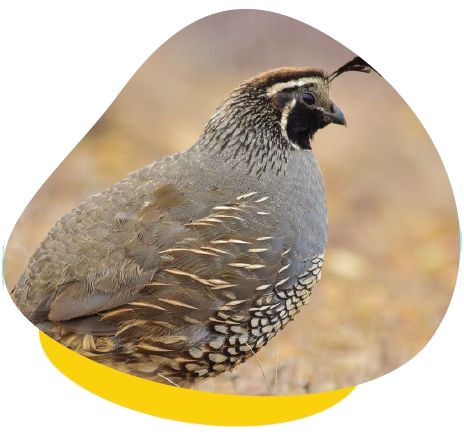
Laying hens diet should contain about 24% protein, 11.7MJ of ME per kilogram, and 2.5-3.0% calcium depending on their egg laying activity. If you are unsure what amount of protein your quail should have then please get in touch with us. Fresh vegetables, mealworms and other small insects as well as safe table scraps can also be offered to supplement the diet. Clean fresh water should be always provided.
An Adult Japanese quail should eat between 14-18g of food per day.
If you are keeping your quails at the bottom of an aviary, please note that if their diet is solely the discarded seed from the birds in the aviary that this does not provide an adequate diet as the birds will normally de-husk the seed leaving only the shell of the seed, and this gives no nutritional benefit.
Common Problems
- Incorrect ratio of male to female – this encourages fighting amongst males and excessive mating of the females which may lead to injuries and/or death.
- Damage from other birds if living in the bottom of an aviary. Even finches have been known to attack quails on rare occasions.
- Broken toes, wings and injuries from being startled and flying into the side or roof of the cage are quite common and need veterinarian attention.
- Lethargy and weight loss are common symptoms that unwell quails may show. Unfortunately, these symptoms are not specific to a particular disease and if you see any of these signs it is best to organise a consultation as soon as possible.
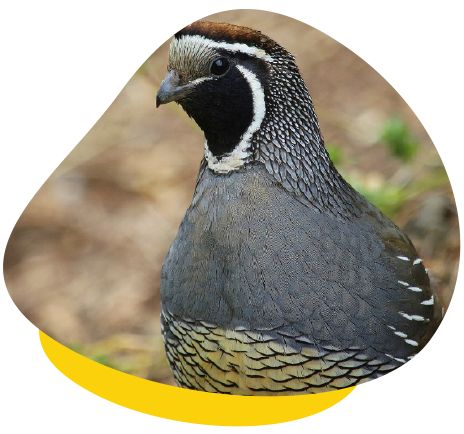
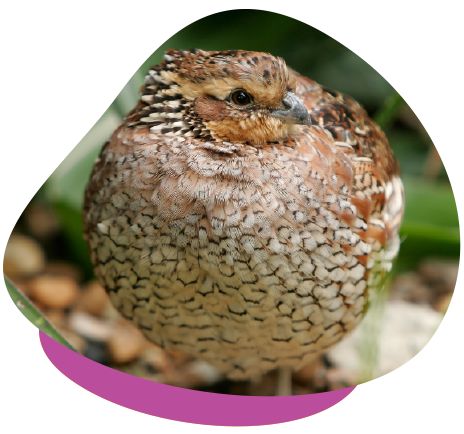
- Worm burdens are common as most poultry are kept on soil or sand; both of which provide a good environment for the worms to breed. Many of the deworming medications that are sold through pet shops are ineffective so it is best to discuss your planned worming protocol with your avian vet to ensure that it will be effective. External parasites are also common in poultry and once again many of the treatment products sold at pet shops are ineffective.
- Quails are susceptible to a range of viruses that can cause symptoms including skin lesions and respiratory disease.
- Reproductive diseases are very common, especially in hens. Quails with reproductive disease can show a range of symptoms with the most common being an enlarged or distended coelom (abdomen) and/or even prolapses. These diseases can be very serious and life-threatening however can be successfully treated in many situations.
We recommend health check-ups for quails every 6-12 months.

